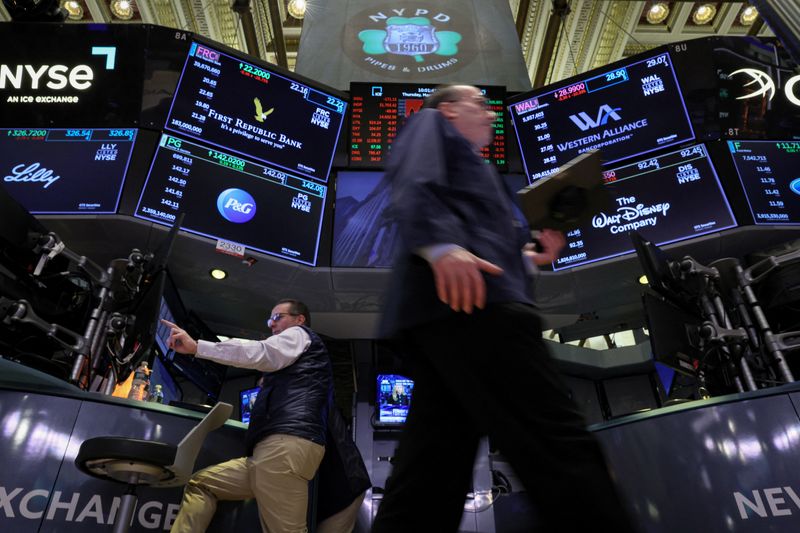
1. Futures muted
US stock futures wavered around the flatline on Wednesday as investors digested the first busy day of the third-quarter earnings season and looked ahead to more corporate results this week.
By 03:31 ET (07:31 GMT), the Dow futures contract had shed 115 points or 0.3%, while S&P 500 futures and Nasdaq 100 futures were mostly unchanged.
The tech-heavy Nasdaq Composite eked out a gain of 0.2% on Tuesday, fueled by an ongoing recovery in Big Tech stocks following a period of market volatility over the summer. Shares in these companies have been buoyed by the Federal Reserve’s decision to slash interest rates by an outsized 50 basis points in September.
However, Wall Street’s two other major indices ended the day in the red, as investors eyed a jump in the benchmark US 10-year Treasury yield to its highest mark since July 26. In the wake of strong recent economic data and deficit fears, some traders are now attempting to gauge if the Fed will still be inclined to cut rates again this year.
The pressure from higher bond yields weighed on the benchmark S&P 500. which dropped marginally by 3 points or 0.1%. The 30-stock Dow Jones Industrial Average also inched down by 7 points or 0.02%.
“While market psychology has turned a bit gloomy in the last 48 hours, this is just a function of the pullback in equities as opposed to a dramatic shift in fundamentals,” analysts at Vital Knowledge said in a note to clients.
2. Tesla earnings ahead
Quarterly results from Tesla following the closing bell on Wednesday are due to highlight the latest batch of earnings.
Shares in the Elon Musk-led electric carmaking giant have taken a hit this month, following the unveiling of its long-awaited robotaxi, which some investors viewed as lacking in concrete details. Year-to-date, Tesla shares have underperformed the S&P 500, losing around 12% compared to the broader index’s 23.4% gain.
Though investors are more upbeat about the US economy after a robust jobs report and last month’s half-point rate cut from the Fed, a soft report from Tesla could revive worries about tech stock valuations.
Stretched valuations, along with high expectations for corporate results and possible volatility around the upcoming US presidential election, could leave stocks vulnerable to a pullback.
3. Texas Instruments profit tops estimates
Shares in Texas Instruments rose in extended hours trading after the chipmaker reported third-quarter income that topped analysts’ expectations.
Earnings per share came in at $1.47 on revenue of $4.15 billion in the three months ended on Sept. 30, the manufacturer of semiconductors that help power electronic devices said. Analysts polled by Investing.com had anticipated per-share profit of $1.38 on sales of $4.12 billion.
In a post-earnings call, Chief Executive Haviv Ilan said the company is benefiting from “momentum” for electric vehicles in China, adding “our content is growing there” and “really drove the growth in the third quarter.”
Sales of Texas Instruments’ automotive-focused products expanded in the upper-single-digits sequentially, Ilan noted.
The figures come as markets are closely eyeing results from global semiconductor firms in an attempt to gauge the outlook for chip demand.
4. Starbucks suspends guidance
Shares in Starbucks slumped in after-hours dealmaking after the coffee chain suspended its outlook through the upcoming fiscal year.
In a preliminary filing, the company also flagged that same-store sales, net revenue and income all declined in the fourth quarter ended on Sept. 29 due to tepid demand for its pricier items in the US.
The announcement underscores the challenge facing new Chief Executive Brian Niccol’s push to turn around Starbucks’ fortunes. Niccol, who assumed the helm of the business in a surprise decision in early August, said that a “fundamental change” to the firm’s strategy is needed “so we can get back to growth.”
In particular, Niccol argued that Starbucks’ menu of drinks and food has become “overly complex.”
However, Starbucks lifted its quarterly dividend to $0.61 from $0.57, a move aimed at bolstering investor confidence around the overhaul plans, CFO Rachel Ruggeri said.
5. Crude slips
Oil prices slipped following the release of industry data pointing to a rise in US crude inventories, but continued Middle East tensions have capped any losses.
By 03:31 ET, the Brent contract dropped 0.6% to $75.62 per barrel, while U.S. crude futures (WTI) traded 0.6% lower at $71.29 a barrel.
Data from the American Petroleum Institute, released Tuesday, showed that U.S. oil inventories grew 1.643 million barrels in the past week, spurring concerns that US fuel demand was cooling. Official US government oil inventory data, from the Energy Information Administration, are due later on Wednesday.
Crude prices gained some ground in the prior session after Israel said it had killed Hashem Safieddine, the heir apparent to the late Hezbollah leader Hassan Nasarallah, who was killed last month by an Israeli strike. Worries about a possible escalation of the conflict between Israel and both Hamas and Hezbollah has seen traders attach a risk premium to crude prices, given the potential of supply disruptions in this oil-rich region.
(Reuters contributed reporting.)
To read the full article, Click Here
